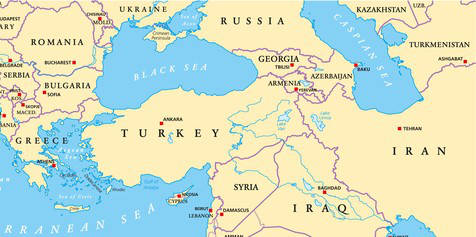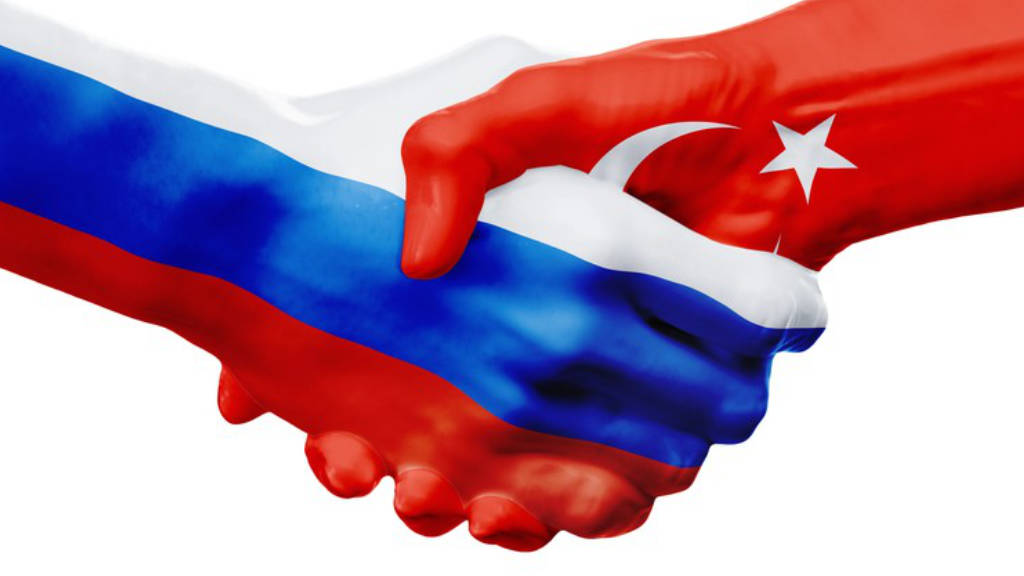Russia’s Deputy Foreign Ministers Sergei Vershinin and Alexander Grushko met with Turkish Deputy Foreign Minister Mehmet Kemal Bozay in Moscow, for consultations to discuss the implementation of strategic economic and energy projects along with regional agenda items.
The Russian Foreign Ministry has said that “The two parties had a substantive exchange of opinions on key items of the Russian-Turkish agenda, including the implementation of strategic projects in the economy and energy sectors. They updated a schedule of upcoming contacts at the top and high levels. They also discussed relevant regional and international problems within the scope of the UN Security Council and General Assembly. Special significance was attached to the situation in the Middle East, focusing on the escalation of violence in the Gaza Strip and Lebanon, as well as global food security, including the situation in the Black Sea area.”
After the Ukraine conflict broke out in 2022, Ankara did not restrict contacts with Moscow as several other NATO members did. Turkiye also only agreed to sanctions approved by the United Nations and did not close its airspace to Russian civil flights. Turkiye became one of the only possible communications channels between Kiev and Moscow.
While discussing the Russia-Turkiye trade situation is normal, there have been subtle hints in some of Russia’s recent dialogue, most notably with Iran and China, that some regional changes may be being planned for. As regards Turkiye and the Black Sea, this would imply some changes to shipping activity – and security – may be underway. With the Ukraine conflict directly impacting Black Sea shipping routes, these types of discussions will be looking at future potential narratives. The Turkish navy patrols the Bosporus channel between the Black and Mediterranean Seas and is a vital part of any alterations in regional sovereignty or shipping activity.
This could also affect Georgia, whose national elections take place next week, which are likely to re-elect the Georgian Dream party, which has a pragmatic policy toward Russia. It refuses to join in anti-Russian sanctions, despite threats from the EU, as this would significantly damage its economic well-being. If the party wins, it can expect increased trade from Georgia’s Black Sea port of Poti, which will require additional monitoring and security in the Black Sea. Ankara will also need to be involved in any future settlement agreements between Kiev and Moscow.

Western sanctions imposed on Russia have redirected global trade flows, with Turkiye becoming one of Russia’s key trading partners. In its efforts to build closer trade links with the Middle East and the Global South at large, Russia has paid special attention to establishing greater trade and economic ties with Turkiye, the key nodal state with the potential to alleviate Moscow’s trade and financial isolation from the West. As has occurred with most of the Middle Eastern and Asian economies, Turkiye has greatly benefited from this re-orientation of trade.
As Turkiye’s economy has experienced a difficult period, ties with Russia have given the potential to minimize negative economic trends. Russia-Turkish trade has jumped by 57% since the conflict in Ukraine broke out. Both will be looking to further expedite these relations. The booming relations between Russia and Turkiye now touch upon an increasing number of sectors, from the expected launch of a joint nuclear power plant project to the work on the Turkish Stream gas pipeline and the sale of S-400 air defense systems.
Thanks to its “no-sanctions policy”, Turkish trade with Russia surged in 2023, reaching US$65 billion, although it prompted the US to warn Ankara of having to face potential sanctions itself if it continues facilitating trade with Russia. Both Ankara and Moscow however have set a target to increase bilateral trade volumes to US$100 billion by 2030. Curiously, and underlining the warping effect Western sanctions are having on Russia’s trade flows, the European Union itself is a key motivator in this trade increase.
This is because Turkiye has increased its imports of Russian energy and begun reselling it to the European Union, while Turkiye was technically abiding by the EU sanctions. In 2023, Turkiye increased its purchase of Russian fuel products by 105% over 2022, while increasing its fuel exports to the EU by 107%. The fuel that Turkiye sold to the EU was still Russian, but as a middleman, Turkiye traded with Europe legally. Energy exports traditionally form the basis of Russian deliveries to Turkiye.
In other categories, Russia mainly imports from Turkiye agricultural produce and beverages, electrical machinery, plastics and products made from it, and organic chemicals. Exports from Russia to Turkiye primarily consist of gas, oil, mineral fuels, mineral oils, and products of their distillation. Russia also exports grain, and copper to Turkiye.
Turkiye will be a major participant in next week’s annual BRICS Heads of State summit in Kazan, which itself, although part of Russia, is an ethically Turkic region with strong connections to Turkiye. Ankara has stated it would like to join BRICS, and if it does, would be the first NATO member to join. That would raise hackles in Brussels, meaning that the Russia-Turkish diplomatic space is a hot topic right now.
Further Reading
Turkiye’s Trade With The BRICS Countries As It Looks To Join

 Русский
Русский













